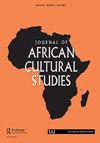Guiding Muslim Women in the University: The Muslim Students’ Society of Nigeria Women’s Programmes in Northern Nigeria
IF 0.7
2区 社会学
Q2 CULTURAL STUDIES
引用次数: 0
Abstract
ABSTRACT This article discusses how the Muslim Students’ Society of Nigeria (MSSN) shapes the way of life of Muslim women in northern Nigeria’s higher educational institutions. The MSSN expects Muslim women to be symbols of piety, home builders and career professionals, and, in line with these objectives, it promotes an Islamic reform that emphasises Western education and the embodiment of prophetic traditions. Many platforms, such as the Sisters’ Circle and Marriage Guidance and Counselling (MAGACO), are used by the MSSN to guide the women on how to achieve this tradition of reform. Through these platforms, the women are engaged on a variety of subjects, such as giving support to acquire Western education, learning the prophetic traditions, and dealing with marital concerns and societal problems that affect their gender. I argue that these platforms enable Muslim women to actively participate in public life and deal with the problems they face in education, religion and marriage. This is demonstrated in their employment in many professional careers, and their ability to stimulate changes, including contesting the notion of women’s education, the women-centred reform orientation of the MSSN, and the government policy on veiling in public schools.指导大学中的穆斯林妇女:尼日利亚穆斯林学生会 尼日利亚北部的妇女计划
ABSTRACT 本文讨论了尼日利亚穆斯林学生会(MSSN)如何塑造尼日利亚北部高等教育机构中穆斯林妇女的生活方式。尼日利亚穆斯林学生会希望穆斯林妇女成为虔诚的象征、家园的建设者和职业专业人员,并根据这些目标,推动伊斯兰改革,强调西方教育和先知传统的体现。MSSN 利用许多平台,如姐妹圈和婚姻指导与咨询(MAGACO),指导妇女如何实现这一改革传统。通过这些平台,妇女们参与了各种主题的活动,如支持她们接受西方教育、学习先知传统、处理婚姻问题以及影响其性别的社会问题。我认为,这些平台使穆斯林妇女能够积极参与公共生活,并处理她们在教育、宗教和婚姻方面面临的问题。这体现在她们在许多专业领域的就业,以及她们推动变革的能力,包括对妇女教育概念的质疑、穆斯林社会党以妇女为中心的改革方向,以及政府关于公立学校戴面纱的政策。
本文章由计算机程序翻译,如有差异,请以英文原文为准。
求助全文
约1分钟内获得全文
求助全文
来源期刊

Journal of African Cultural Studies
Multiple-
CiteScore
1.70
自引率
10.00%
发文量
13
期刊介绍:
The Journal of African Cultural Studies publishes leading scholarship on African culture from inside and outside Africa, with a special commitment to Africa-based authors and to African languages. Our editorial policy encourages an interdisciplinary approach, involving humanities, including environmental humanities. The journal focuses on dimensions of African culture, performance arts, visual arts, music, cinema, the role of the media, the relationship between culture and power, as well as issues within such fields as popular culture in Africa, sociolinguistic topics of cultural interest, and culture and gender. We welcome in particular articles that show evidence of understanding life on the ground, and that demonstrate local knowledge and linguistic competence. We do not publish articles that offer mostly textual analyses of cultural products like novels and films, nor articles that are mostly historical or those based primarily on secondary (such as digital and library) sources. The journal has evolved from the journal African Languages and Cultures, founded in 1988 in the Department of the Languages and Cultures of Africa at the School of Oriental and African Studies, London. From 2019, it is published in association with the International African Institute, London. Journal of African Cultural Studies publishes original research articles. The journal also publishes an occasional Contemporary Conversations section, in which authors respond to current issues. The section has included reviews, interviews and invited response or position papers. We welcome proposals for future Contemporary Conversations themes.
 求助内容:
求助内容: 应助结果提醒方式:
应助结果提醒方式:


